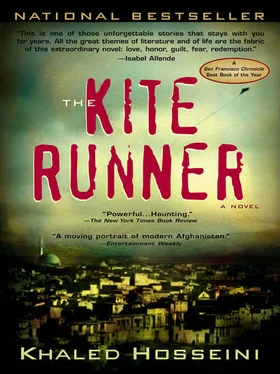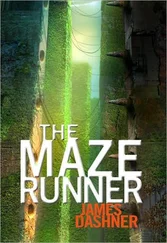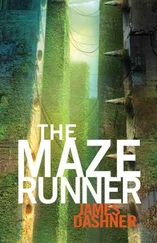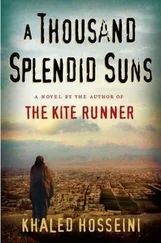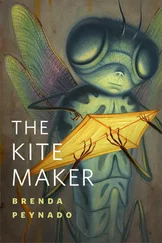The waiter placed a teacup on the table before me. Where the table’s legs crossed like an X , there was a ring of brass balls, each walnut-sized. One of the balls had come unscrewed. I stooped and tightened it. I wished I could fix my own life as easily. I took a gulp of the blackest tea I’d had in years and tried to think of Soraya, of the general and Khala Jamila, of the novel that needed finishing. I tried to watch the traffic bolting by on the street, the people milling in and out of the little sweetshops. Tried to listen to the Qawali music playing on the transistor radio at the next table. Anything. But I kept seeing Baba on the night of my graduation, sitting in the Ford he’d just given me, smelling of beer and saying, I wish Hassan had been with us today .
How could he have lied to me all those years? To Hassan? He had sat me on his lap when I was little, looked me straight in the eyes, and said, There is only one sin. And that is theft… When you tell a lie, you steal someone’s right to the truth . Hadn’t he said those words to me? And now, fifteen years after I’d buried him, I was learning that Baba had been a thief. And a thief of the worst kind, because the things he’d stolen had been sacred: from me the right to know I had a brother, from Hassan his identity, and from Ali his honor. His nang . His namoos .
The questions kept coming at me: How had Baba brought himself to look Ali in the eye? How had Ali lived in that house, day in and day out, knowing he had been dishonored by his master in the single worst way an Afghan man can be dishonored? And how was I going to reconcile this new image of Baba with the one that had been imprinted on my mind for so long, that of him in his old brown suit, hobbling up the Taheris’ driveway to ask for Soraya’s hand?
Here is another cliché my creative writing teacher would have scoffed at; like father, like son. But it was true, wasn’t it? As it turned out, Baba and I were more alike than I’d ever known. We had both betrayed the people who would have given their lives for us. And with that came this realization: that Rahim Khan had summoned me here to atone not just for my sins but for Baba’s too.
Rahim Khan said I’d always been too hard on myself. But I wondered. True, I hadn’t made Ali step on the land mine, and I hadn’t brought the Taliban to the house to shoot Hassan. But I had driven Hassan and Ali out of the house. Was it too far-fetched to imagine that things might have turned out differently if I hadn’t? Maybe Baba would have brought them along to America. Maybe Hassan would have had a home of his own now, a job, a family, a life in a country where no one cared that he was a Hazara, where most people didn’t even know what a Hazara was. Maybe not. But maybe so.
I can’t go to Kabul, I had said to Rahim Khan. I have a wife in America, a home, a career, and a family. But how could I pack up and go back home when my actions may have cost Hassan a chance at those very same things?
I wished Rahim Khan hadn’t called me. I wished he had let me live on in my oblivion. But he had called me. And what Rahim Khan revealed to me changed things. Made me see how my entire life, long before the winter of 1975, dating back to when that singing Hazara woman was still nursing me, had been a cycle of lies, betrayals, and secrets.
There is a way to be good again, he’d said.
A way to end the cycle.
With a little boy. An orphan. Hassan’s son. Somewhere in Kabul.
ON THE RICKSHAW RIDE back to Rahim Khan’s apartment, I remembered Baba saying that my problem was that someone had always done my fighting for me. I was thirty-eight now. My hair was receding and streaked with gray, and lately I’d traced little crow’s-feet etched around the corners of my eyes. I was older now, but maybe not yet too old to start doing my own fighting. Baba had lied about a lot of things as it turned out but he hadn’t lied about that.
I looked at the round face in the Polaroid again, the way the sun fell on it. My brother’s face. Hassan had loved me once, loved me in a way that no one ever had or ever would again. He was gone now, but a little part of him lived on. It was in Kabul.
Waiting.
I FOUND RAHIM KHAN praying namaz in a corner of the room. He was just a dark silhouette bowing eastward against a bloodred sky. I waited for him to finish.
Then I told him I was going to Kabul. Told him to call the Caldwells in the morning.
“I’ll pray for you, Amir jan,” he said.
Again, the car sickness. By the time we drove past the bullet-riddled sign that read THE KHYBER PASS WELCOMES YOU, my mouth had begun to water. Something inside my stomach churned and twisted. Farid, my driver, threw me a cold glance. There was no empathy in his eyes.
“Can we roll down the window?” I asked.
He lit a cigarette and tucked it between the remaining two fingers of his left hand, the one resting on the steering wheel. Keeping his black eyes on the road, he stooped forward, picked up the screwdriver lying between his feet, and handed it to me. I stuck it in the small hole in the door where the handle belonged and turned it to roll down my window.
Farid gave me another dismissive look, this one with a hint of barely suppressed animosity, and went back to smoking his cigarette. He hadn’t said more than a dozen words since we’d departed from Jamrud Fort.
“Tashakor,” I muttered. I leaned my head out of the window and let the cold midafternoon air rush past my face. The drive through the tribal lands of the Khyber Pass, winding between cliffs of shale and limestone, was just as I remembered it – Baba and I had driven through the broken terrain back in 1974. The arid, imposing mountains sat along deep gorges and soared to jagged peaks. Old fortresses, adobe-walled and crumbling, topped the crags. I tried to keep my eyes glued to the snowcapped Hindu Kush on the north side, but each time my stomach settled even a bit, the truck skidded around yet another turn, rousing a fresh wave of nausea.
“Try a lemon.”
“What?”
“Lemon. Good for the sickness,” Farid said. “I always bring one for this drive.”
“Nay, thank you,” I said. The mere thought of adding acidity to my stomach stirred more nausea. Farid snickered. “It’s not fancy like American medicine, I know, just an old remedy my mother taught me.”
I regretted blowing my chance to warm up to him. “In that case, maybe you should give me some.”
He grabbed a paper bag from the backseat and plucked a half lemon out of it. I bit down on it, waited a few minutes. “You were right. I feel better,” I lied. As an Afghan, I knew it was better to be miserable than rude. I forced a weak smile.
“Old watani trick, no need for fancy medicine,” he said. His tone bordered on the surly. He flicked the ash off his cigarette and gave himself a self-satisfied look in the rearview mirror. He was a Tajik, a lanky, dark man with a weather-beaten face, narrow shoulders, and a long neck punctuated by a protruding Adam’s apple that only peeked from behind his beard when he turned his head. He was dressed much as I was, though I suppose it was really the other way around: a rough-woven wool blanket wrapped over a gray pirhan-tumban and a vest. On his head, he wore a brown pakol , tilted slightly to one side, like the Tajik hero Ahmad Shah Massoud – referred to by Tajiks as “the Lion of Panjsher.”
It was Rahim Khan who had introduced me to Farid in Peshawar. He told me Farid was twenty-nine, though he had the wary, lined face of a man twenty years older. He was born in Mazar-i-Sharif and lived there until his father moved the family to Jalalabad when Farid was ten. At fourteen, he and his father had joined the jihad against the Shorawi . They had fought in the Panjsher Valley for two years until helicopter gunfire had torn the older man to pieces. Farid had two wives and five children. “He used to have seven,” Rahim Khan said with a rueful look, but he’d lost his two youngest girls a few years earlier in a land mine blast just outside Jalalabad, the same explosion that had severed toes from his feet and three fingers from his left hand. After that, he had moved his wives and children to Peshawar.
Читать дальше
